#but that's because Illusion (Shadow) works a *lot* like Evocation even if you save to disbelieve
Explore tagged Tumblr posts
Text
#sudden inspiration strikes#(was thinking in D&D terms because of the original Baldur's Gate backend list of 19 programmed genders)#you're probably expecting me to say Evocation#but that's because Illusion (Shadow) works a *lot* like Evocation even if you save to disbelieve
94 notes
·
View notes
Text
The Links as D&D Characters, Part 4: Violet (Vio) Link
Inspired by a question I saw on @hauntinghyrule ‘s blog. My character analysis and thoughts on what character class the boys would be if they were D&D characters, and why.
Green / Red / Blue / Shadow / Vaati / FS Zelda
As a preface, there won’t be any doubles on classes except in the case of dual-classing, and in those cases the first class I talk about my justifications for will be the primary class (i.e. the class they would have chosen at level one). My choices will be based on the character theming and personalities, even though at a base level it would be easy to say “they’re all paladins, duh” because of the implied “holy knight chosen by the gods to eradicate evil” concept. Vio is a high Intelligence, high Dexterity, high Charisma character- or at least he is based on his depiction in the manga. You may be thinking: Athena, what do you mean Vio has high charisma? Isn’t he more known for his intelligence and strategic abilities? You’re right, and also, you misunderstand. He’s not using that high charisma for Persuasion or Performance or even Intimidation. Remember how Vio spends an entire story arc fooling Shadow into thinking they were friends and Vio was evil, and how he also fooled Green, Red, and Blue (up until giving Green the hint that he was a double agent)? That’s all going into Deception baby! There’s only two classes that I can think of where Intelligence, Dexterity, and Charisma (1 out of the two for CHA actually) are major players: Wizards and Rogues. My actual pick is Rogue, but we’ll go through Wizard just to see why I didn’t go with Wizard. Vio’s demeanor lends itself well to the vision of a wizard- wizards are spellcasters that gain magic through intense study, and Vio is seen carrying a book around during the manga. This book somehow magically has the answers to whatever he needs (or it was just specifically written about Force Gems and I’m being dramatic), and Wizards have spellbooks that have their spells in it. Vio could be a really great wizard, but there’s three issues I personally found with that. 1. Wizards have low HP. Their hit dice is a d6 (a trait they share with Sorcerers), and Vio could go head to head with Green in melee combat. Of course, low health doesn’t usually matter if you don’t get hit, but the whole point of a wizard is to hide behind the beefier tanks and blast the big bad monster with meteor strikes and giant explosions and like a whole lot of psychic damage and pray to whatever gods might take pity on a poor arcane magic user that the big bad doesn’t just like. . .step on them. Vio may not be as much of a front line fighter as say, Green and Blue are, but he’s not squishy. 2. Wizard subclasses give tons of variety in terms of how you can play them, but I don’t see any of the wizard Arcane Traditions being worth the low health, complete lack of armor and complete lack of ranged weapons (meaning Vio wouldn’t have access to his signature bow). School of Abjuration isn’t a good fit, because Vio’s idea of protecting is to actually throw himself head first into danger (like when he dived in front of Stone Arrghus to save Red, or like the entire double-agent arc). School of Conjuration doesn’t have anything that really relates to Vio symbolically or in regards to his story arc. School of Divination could be a good fit for him, since he’s all about knowledge and anticipating what the enemy is going to do next, but then. . .Blue’s weird spidey-sense in the Erune & Rosie story could make him a contender for that if his intelligence stat were high enough. School of Enchantment is a no, because even though Vio has high enough charisma to deceive pretty much everybody in the double-agent arc, he’s not. . .ever really shown doing anything else charismatic, and it just doesn’t seem fitting for the type of character he is. School of Evocation is the magic of big explosions and elemental magic, which is great, but showing off is rarely Vio’s style. School of Illusion is really the only one that might fit, and only because of Vio’s deceptive and manipulative nature, but again he doesn’t get to have archery and if he doesn’t get to have archery what’s the fucking point. School of Necromancy is stereotyped as the “evil” option (which personally I don’t agree with but I didn’t write the rules) or at the very least taboo magic, which I don’t see Vio being in pursuit of knowledge enough to dip into that well. Finally, School of Transmutation symbolically works for his character arc: he transforms by learning that the world isn’t quite as black and white as he thought it was, and Shadow was not as evil as he seemed; however, that’s a bit of a stretch.
3. All of this was a very long-winded way of saying that I didn’t make him a wizard even though it would be a decent fit because I’m saving wizard for a different character and thank you for reading that long ass paragraph. So why does rogue fit better? Rogues are OP as fuck, that’s why. They get access to ranged weapons, and at first level you get to choose four skills. Four whole skills out of Acrobatics, Athletics, Deception, Insight, Intimidation, Investigation, Perception, Performance, Persuasion, Sleight of Hand, and Stealth. Vio then gets to take up to a max of 4 of those skills (or any of the skills he has proficiency with) and double how good he is at those things. Vio has the most potential to be a fairly stealthy, strike from the shadows type of fighter. Or rather, according to the rules of Sneak Attack (which does 10d6, or an average of 35 extra damage on a hit), strike from within 5 feet of Blue, Green or Red who are also fighting the same enemy. Rogue Vio gets to learn secret codes and how to pick locks, he can Dodge, Dash, or Hide without taking up his attacking action. He can reduce the amount of damage he takes as a reaction, he gets proficiency in Wisdom saving throws (thank god because he actually needs it), ignore enemy advantage and turn missed attacks into hits. He’s just so tactical! So strategic! And rogue’s Blindsense also means that he has fucking echolocation up to 10 feet. So we’re really hitting all of the marks on what makes Vio a better Rogue than he is a Wizard, and we still haven’t talked about Roguish Archetypes. In Xanathar’s Guide to Everything, there is a Roguish Archetype called Mastermind. It’s description reads “A master tactician, manipulates others”. That’s Vio. He’s in the book. Admittedly, Vio isn’t just manipulative, smart, a tactician, deceptive, etc.- there are times in the manga where he’s sensitive, foolhardy, bull-headed and just not the brightest. Like saying that all Blue is is an angry hot-head, saying Vio is just a non-emotional strategist is a disservice to his character. Vio has lots of book smarts, but he is not wise. Key example of this: the entire Shadow Link and “Evil” Vio arc. We see his perspective actually get challenged by the way Shadow acts and treats him. Prior to that story line he probably saw Shadow as a one-dimensional villain, but after. . .well, he learned not to judge a book by its cover. Mastermind Rogue is actually well-suited to this lesson- it focuses on learning the secrets underneath the exterior of a person. Granted that does come back around to manipulating and strategizing again, but the point is that he would learn to be more mindful of what a person could actually be like instead of what they portray on the surface. It gives him proficiency with the disguise kit, forgery kit, and a gaming set, as well as two extra language. Further adding to my personal headcanon: Vio is talented as shit. Jack of all trades, master of none. The Help action gets added to the Dodge, Dash and Hide list as tactics he can use without having to take up his attacking action, and the range of that Help action extends up to 30 feet. Insightful Manipulation grants him the ability to learn the INT, WIS, and CHA stats of a target that he interacts with or observes for a set amount of time, and as a reaction he can have an attack target someone else instead of him. At the highest level of Mastermind, his mind can literally not be read by telepathy or any other means, and in a Zone of Truth area of effect he can lie his ass off even if he failed the saving throw and no matter what he says he’s telling the truth according to the spell. He can bullshit a lie detector test and get away with it. Mastermind Rogue Vio. He’s like that one vine that goes “you better watch out, you better watch out, you better watch out, you better watch out-”.
#You know the one#Vio needs his bow and arrows its very important!#who am i saving wizard for#the world may never know#i was going to go over the benefits of him taking 3 levels of fighter and taking Eldritch Knight for some wizard spells#but like the same effect could be accomplished with the Magic Initiate feat#four swords#dungeons and dragons#violet link#character analysis
34 notes
·
View notes
Photo
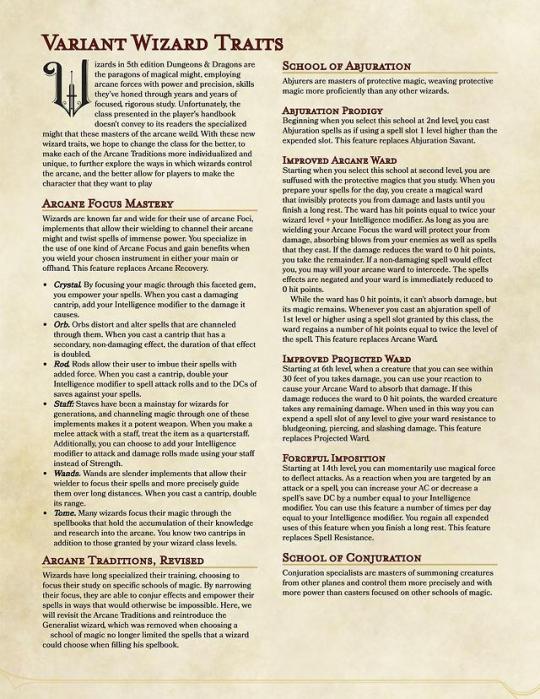
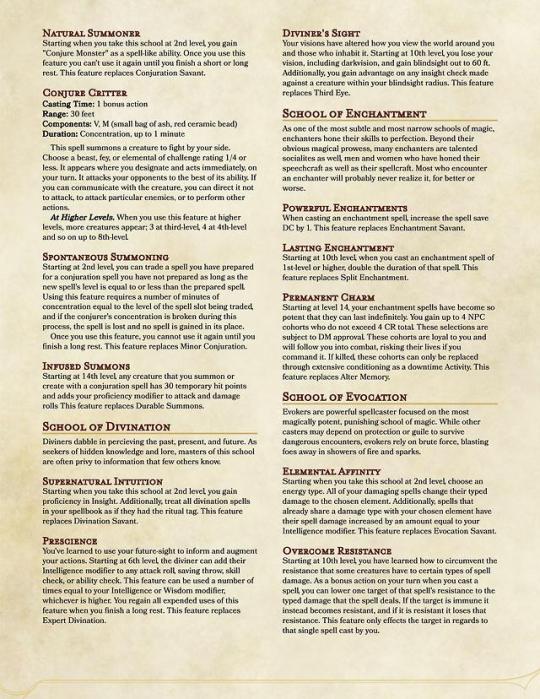
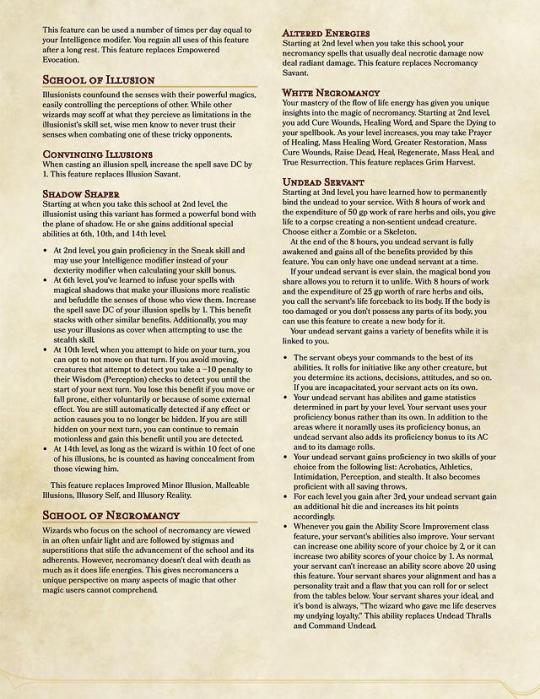
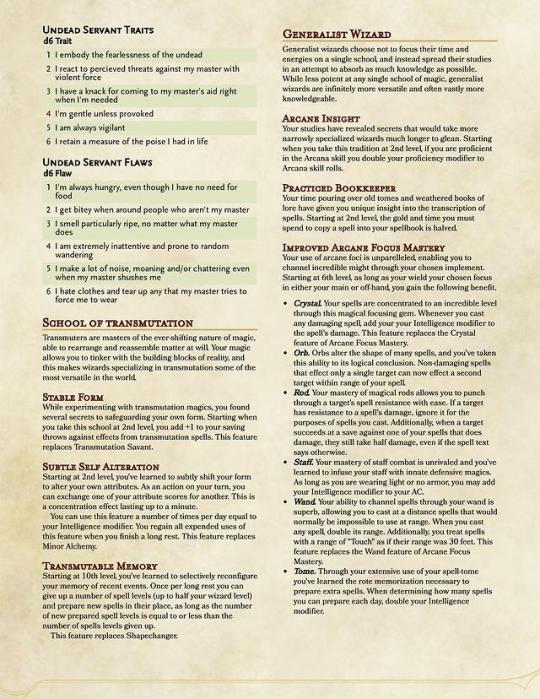
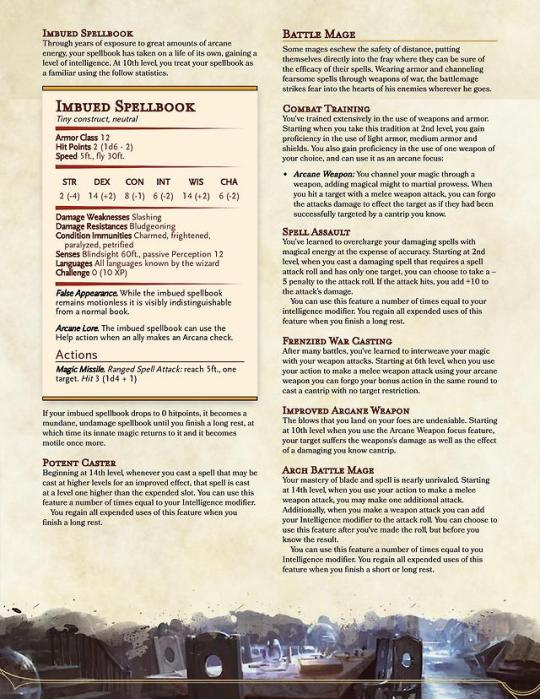
(!IMPORTANT EDIT: This has been revised since it was posted, making this version out-of-date. All content presented herein should be considered unbalanced/unfinished!) (Disclaimer: I’m really tired right now so forgive me if I ramble)
Aight, now we're getting into some of the heavier rules additions I've made. Let me preface this by saying I love wizards. I think they're just as versatile as clerics while having much more characterization flexibility. That said, I really dislike wizards in 5th ed. They just feel boring, with nothing that really projects that classic wizard feel. School specialization is much less of an impactful choice than in previous editions, and the bonuses granted by your chosen school are generally boring or require silly, exploitative combos to make use of. After finally getting around to playing one and being thoroughly underwhelmed, I decided to take a crack at actually making this class fun to play
NOTE: NONE of this content has been playtested yet. Between two seperate campaings, None of my players have chosen to play arcane spell casters, so I've yet to have a chance to see it in action. I can only image some of these options are overpowered, so it may have to be adjusted on the fly to adjust for player shenanigans.
Let me start by saying this was a major process. I went into 4th and 3/3.5 to find inspiration for the direction I wanted to take the various schools and new rules, and I think I found several ways to make the class and its options feel much more unique. Characterization is always the most important part of creating and playing characters, at least for me, and I feel like every option should strive to push that idea. Starting at the very beginning with implement masteries, you're already seperating your character from other wizards. Down with same-y features, up with options. I'm just going to kind of skim over all of the school and give my basic thoughts and process on the overhaul, even though I'm tempted to gush about all of them because, honestly, I think there's a lot to love here.
Of special note, SAVANT FEATURES NO LONGER EXIST. Cutting the time and cost to copy spells is so contrived and inconsequential that I see their inclusion as more of an insult than a gift. These have all been replaced with something that directly powers up the schools theme because that is way more fun. Also, these are meant to be mixed and matched with the schools as they exist in the PHB. These features all list which feature they replace so you can choose which one you prefer between the two of them when you reach a level that grants you a new feature. - Abjuration: I think that, of all the schools, 5e did the best with abjuration. The base features fit the theme nicely and it's actually a viable way to build a defensive wizard. A bit of a power boost and push 'em out the door with a pat on the bottom. - Conjuration: Lets face it: Summoning in 5e sucks. At lower levels you can summon creatures so rarely it that it doesn't properly lend flavor to the class, and at higher levels its completely outshined by massive, reality altering spells like wish and meteor storm or whatever. This set of features includes a once per day cantrip-level summoning ability and a direct upgrade to the weak level 14 feature from the PHB. Summoning spells are admitedly pretty one dimensional, so if you choose a large number of them to prepare you may come up short on versatility. I was looking for a way to circumvent that issue, and figured that a wizard specialized in summoning would know the spells well enough that they could spontaneously cast them. - Divination: I really like this one, specifically because of how flavorful it is. As you can see, there is no level 2 talent to replace portent because portent is just that good. It's powerful, it's fun, it's flavorful, I just can't see another talent that could be a viable contender for portent. I think expert divination is far to situational and makes little sense for the school, so I present prescience as an option I think it potentially equal in power but way more fitting. And finally, diviner's sight is, in my opinion, the most interesting roleplay option in 5th ed at this time. Imagine a wizard who has looked to far and seen too much, whose vision has been seared away by things no one was meant to see. UGH. So cool. The 60ft of blindsight is awesome and gets around some tricky tricks. - Enchantment: Enchantment already has some cool stuff going on, so I just wanted to make the spells harder to save against because casting something like command and then having the target save is the biggest waste of a turn in this edition of D&D. - Evocation: The biggest change here is elemental affinity, the almost surely broken way to play a real fire or ice or thunder or whatever mage. I think it's fine, but I can see it really causing issues if a player is specifically trying to exploit it. - Illusion: THIS ONE IS COOL GUYS. WOW. This suite of features straight up turns your wizard into a shadow caster. How cool is that?! Balanced from what I can tell as well, but it'll need to see play before I can be sure. - Necromancy: This is the one where I know I done messed up. I love necromancers. Love love love them. I'm an edgy preteen for them. I've also got a lot of thoughts on how they work, and I wanted to highlight some of that here. Necromancers don't so much command death magic as their magic simply manipulates life force. I feel that for a wizard so inclined, it wouldn't be difficult to simply turn that process around. What I'm trying to say is white necromancy and wizards with healing spells. I also added an option that gives the wizard a permanent hunter-style undead companion. Very, very cool but PROBABLY a bit too strong. - Transmutation: Transmutation is cool, and I really like the flavor of changing yourself to be the ultimate jack of all trades. As with everything else, the savant trait has been replaced. - Generalist: I really like the idea of this one, and it has a very classic wizard feel. More focus on the focus, a neat pet, and stronger spells? Yee. - Battle Mage: I'm not so sure about this one. I made these a while back before any of the other combat caster classes came out, so I honestly might end up just scrapping it.
Anyway, I'll probably be dropping some actual setting material next time, most likely the other section on arcane magic. It's blood magic all the way down, kids...
(Content PDF)
1K notes
·
View notes